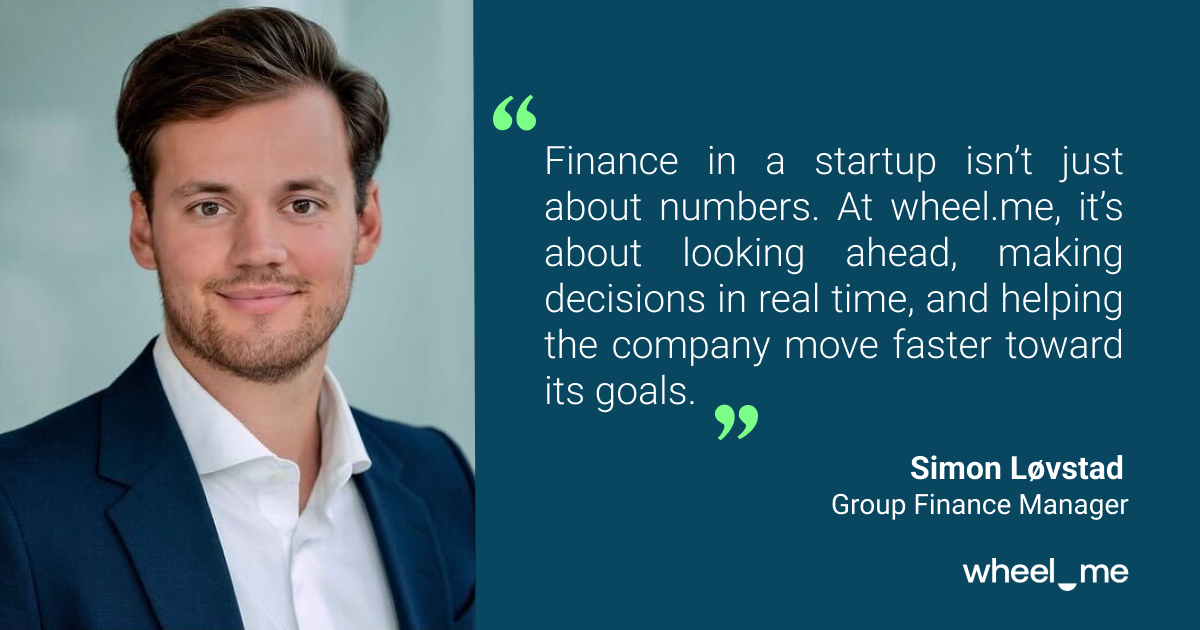Behind the Wheel: Simon Løvstad on Finance, Strategy, and Building Structure on the Move
At wheel.me, we often say our wheels can move anything. But it’s the people behind the scenes who make sure the company itself keeps moving forward. In this edition of Behind the Wheel, we sit down with Simon from our finance team, who swapped traditional industries for the fast-paced world of robotics. We talked about what drew him to finance in tech, the biggest differences he’s noticed from his previous roles, and why finance at wheel.me is as much about strategy and teamwork as it is about numbers.

What drew you to finance in a robotics company like wheel.me?
“What appealed to me was the chance to learn more about what it takes to run a growing company and to be closer to the decision-making process. Coming from more traditional industries, I was used to structured environments where risks were mapped and processes already set. At wheel.me, those processes often need to be built in real time, which makes the work dynamic and exciting.
The finance team’s role is to make sure engineers and developers have the resources they need to design and build our robots. That’s both challenging and rewarding in an environment where things are constantly moving - quite literally, in our case.”
What’s been the biggest difference you’ve noticed between working in traditional finance environments and in a fast-growing tech company?
“At wheel.me, most of our resources go directly into engineering and product development. That means we keep administrative functions like finance lean by design. In larger financial institutions, there’s usually a specialist for every situation. Here, you often need to be comfortable making decisions and figuring things out as you go.
It also requires a broader perspective. You can’t just sit in the finance bubble. Understanding how the product works, what our customers value, and what drives the business forward is key. Coming from an audit background, getting up to speed on the technical side has probably been the steepest learning curve, but also one of the most valuable.”
Finance at wheel.me isn’t just about crunching numbers. It’s also about strategy and collaboration. How do you work with other teams across the company?
“A lot of the work starts with understanding what different teams are trying to build. Developers naturally want to use the best tools and components to deliver the strongest possible product, and that’s exactly what we want as a company. Finance steps in to help assess what that means in practice: what it costs, what trade-offs it involves, and how it fits into the bigger plan.
I work closely with teams across software, hardware, production and commercial. That means discussing priorities, structuring pricing models, or helping allocate resources. The goal isn’t to limit ambition, but to help turn it into something scalable and sustainable. As much as we’d all love to gold-plate the robots, someone must ask what that does to the margin.”
With operations across multiple markets, you have also had to navigate the financial complexities of scaling internationally. How do you handle financial complexity across regions?
“The key is to strike the right balance between consistency and adaptability. We aim to build financial models and reporting structures that provide a shared framework across the company, while still allowing for local differences in regulation, costs, and commercial models.
Part of that is working closely with our teams on the ground, both in Europe and in Detroit, to understand how things work in each market. It’s been a good reminder that ‘best practice’ doesn’t always mean the same thing everywhere. Many challenges are best solved locally, close to the customer and with knowledge of the relevant rules.
It’s an ongoing process that requires structure, trust, and communication. The goal is to enable sound decisions across regions without losing sight of what makes each of them unique.”
What’s something people often misunderstand about finance in tech startups or robotics?
“One thing I experienced early on was the lag between costs and income when you handle the full value chain yourself. At wheel.me, we manage most processes in-house from R&D and software development to production, sales, marketing and support. That full-stack approach gives us more control, but it also means costs come early and are spread across many functions long before revenue catches up.
That’s why finance needs to be forward-looking and closely connected with both technical and commercial teams. It’s not just about keeping the books until the next funding round, it’s about enabling progress and making sure resources are used in ways that move the company forward.”
Of course, no one can live on numbers and strategy alone. What do you do outside of work to relax after a long day?
“I always try to squeeze in a short exercise so the following dinner on the couch tastes even better.”
Simon’s story is a reminder that finance isn’t just about balancing the books. At wheel.me, it’s about balancing ambition and sustainability so innovation can keep rolling forward.




